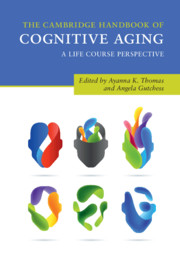Book contents
- The Cambridge Handbook of Cognitive Aging
- The Cambridge Handbook of Cognitive Aging
- Copyright page
- Contents
- Figures
- Tables
- Contributors
- Introduction
- Part I Models of Cognitive Aging
- Part II Mechanisms of Cognitive Aging
- Part III Aging in a Socioemotional Context
- Part IV Cognitive, Social, and Biological Factors across the Lifespan
- 23 Prenatal Influences on Cognitive Aging
- 24 Associations between Activity Participation across the Life Course and Cognitive Aging
- 25 Cognitive Aging and Culture: Older Brain Predictions about Different Environments
- 26 Current Perspectives on Aging and Bilingualism across the Life Span
- 27 Grit and Successful Aging
- 28 Control and Cognition: Contextual and Individual Differences in Cognitive Aging
- 29 Cognition and Well-Being across Adulthood and Old Age
- 30 The Genetics of Cognitive Abilities
- 31 Blood Biomarkers of Cognitive Health and Neurodegenerative Disease
- Part IV Summary: Early Life and Biological Factors
- Part V Later Life and Interventions
- Index
- Plate Section (PDF Only)
- References
31 - Blood Biomarkers of Cognitive Health and Neurodegenerative Disease
from Part IV - Cognitive, Social, and Biological Factors across the Lifespan
Published online by Cambridge University Press: 28 May 2020
- The Cambridge Handbook of Cognitive Aging
- The Cambridge Handbook of Cognitive Aging
- Copyright page
- Contents
- Figures
- Tables
- Contributors
- Introduction
- Part I Models of Cognitive Aging
- Part II Mechanisms of Cognitive Aging
- Part III Aging in a Socioemotional Context
- Part IV Cognitive, Social, and Biological Factors across the Lifespan
- 23 Prenatal Influences on Cognitive Aging
- 24 Associations between Activity Participation across the Life Course and Cognitive Aging
- 25 Cognitive Aging and Culture: Older Brain Predictions about Different Environments
- 26 Current Perspectives on Aging and Bilingualism across the Life Span
- 27 Grit and Successful Aging
- 28 Control and Cognition: Contextual and Individual Differences in Cognitive Aging
- 29 Cognition and Well-Being across Adulthood and Old Age
- 30 The Genetics of Cognitive Abilities
- 31 Blood Biomarkers of Cognitive Health and Neurodegenerative Disease
- Part IV Summary: Early Life and Biological Factors
- Part V Later Life and Interventions
- Index
- Plate Section (PDF Only)
- References
Summary
The aging of any biological system results in quantifiable change which may affect the output of the system in subtle or substantial ways. Human cognitive aging is no exception and the manner in which the system, in this case the brain, is able to withstand and/or adapt to the effects of age-related physiological change will determine the individual cognitive trajectory. In this chapter, we review the emerging field of blood biomarkers of cognitive aging with a focus on specific metabolic pathways implicated in cognitive health including cellular energetics, lipid metabolism, the maintenance of redox state, and inflammation. Challenges to blood biomarker development, including methodological and inferential limitations, are also reviewed. Ultimately, blood biomarkers of age-related neurodegenerative disease and cognitive success will provide clues for how we might all age successfully, reducing health care burden on societies and improving quality of life for individuals.
Keywords
- Type
- Chapter
- Information
- The Cambridge Handbook of Cognitive AgingA Life Course Perspective, pp. 568 - 586Publisher: Cambridge University PressPrint publication year: 2020

